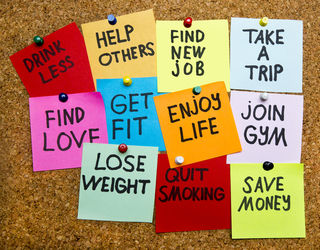Stress
5 Brain-Savvy Resolutions for the New Year
Become a resiliency superstar with these neuroscience-based strategies
Posted December 26, 2017
Right after the last bite of pumpkin pie slathered with whipped cream goes down, a circuit in our unconscious mind begins crafting resolutions for the New Year. In the age of neuroscience, specifically, training the emotional brain, we can use strategies that are brain-friendly so it's easier to create a happy, healthy 2018.
Strategy 1 – Choose Natural Pleasures Not Addictive Substitutes
We want and need pleasure. It calms stress, balances the brain and opens our minds to the emerging possibilities of the New Year. We have two choices: natural pleasures that our hunter-gatherer ancestors chose or addictive delights that are artificial. The holidays are full of artificial pleasures and excesses, so it's easy to substitute seemingly healthy excesses in developing resolutions. Instead, choose to balance your brain by bingeing on natural pleasure. Train your brain to the subtle layers of joy that come from simple activities, like rocking out to music, shooting hoops in the living room, taking the dog a run around the block. Natural pleasure binges are particularly effective in turning off those after 7 p.m. drives for refined sugars and alcohol when our neurotransmitters are drained after meeting (or exceeding) the demands of the day.
Strategy 2 – Load Up On Emotional Connection
Our deepest need is to emotionally connect with others. The drives to overeat or drink too much are activations of emotional circuits encoded when we needed love and it was not available. The brain naturally found a ready substitute, such as sugar, wine, texting or spending and a "brain glitch" was encoded, causing us to have strong drives for that love substitute. We need to rewire these circuits, but it helps to meet that original need for loving connection. Rather than holing away in January with solo activities, find ways to emotionally connect with others. Even viewing movies with heart-warming storylines can help. Recently, EBT added an option to drop in for a workshop or listen to a tape of it, so that people can hear other people doing emotional rewiring work. The emotional brain needs the connection of the human voice and experience, not just exercise and healthy food.

Strategy 3 – Fall in Love with Yourself, Then Attract A Partner
A common resolution is to find love. However, we attract others who are at our emotional set point, whether we want to or not. Perhaps they seem our opposite or opposite our last love that disappointed us, but chances are they share our emotional set point. What's the sensible way to attract a healthy mate? Raise your own set point. That takes clearing away the emotional clutter from past hurts and learning how to fall in love with yourself, the perfect foundation for falling in love with a healthy other. Therapy can help, and raising the set point is the goal of EBT. Many people take a break from the dating game, ramp up their skills to emotionally connect with themselves and find that when the resume dating, they attract people who are securely connected to themselves, too.
Strategy 4 - Lean Into Stress – It's An Opportunity to Rewire
With the New Year comes more of those impossible demands at work and home, which means . . . stress. Update your views toward stress. When we get triggered or stalled, stress can be overwhelming and deleterious, but these moments can be highly effective in improving our resiliency. Those circuits that cause stress overload are only open to rewiring when we are at the same level of stress in which they were encoded. That's why psychotherapy can be stressful at times. That stress helps unlock circuits that are self-limiting so you can change them. In EBT, members learn how to take those moments of stress and use them to encode resiliency and rewire those old beliefs and patterns. When those stressful moments crop up, think of them as moments of opportunity to rewire the past and reset your brain to enhance your set point.
Strategy 5 - Check Your Stress Number Not Your Feelings
If you're an overthinker who tends to analyze why you do what you do and berate yourself for ruminating, consider letting go of that judgment. At the same time, skip asking yourself, "How do I feel?" Thinking has been shown to flunk the stress test, but checking your feelings has limited benefit, too. Based on stress physiology, only when we are in low-stress states do feelings tell us what we need. In high-stress states, emotions activate old patterns, activating cravings for food, alcohol, spending, texting and more. Update your approach to self-regulation by checking your stress level. There are five levels of stress, ranging from Stress Number 1, in which when feelings are accurate and we feel great to Stress Number 5, in which feelings are distorted and we feel overwhelmed or numb. Just knowing your stress number can increase your self-compassion, which is a great stress reliever.
Give one or more of these brain-savvy strategies a try and begin working with your own brain to raise your emotional set point and creating an amazing New Year.


